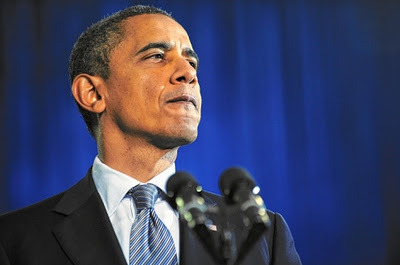My Barack Obama Problem

My Barack Obama Problem by Mark Naison | special to NewBlackMan
Like manypeople on the Left, I have become disillusioned with the ObamaPresidency. As one of those people who devoted huge amounts of time,money and energy to getting Obama elected, and who cried on election night whenhis victory was assured, I found myself hoping against hope that there wassome redemptive quality to his leadership amidst expansion of foreignwars, attacks on public school teachers, bailouts of banks unaccompaniedby serious controls, and a host of other policies that appeared to contradicteverything he stood for during his campaign.
Although myheart wasn't in it, I tried to justify his policies as the result of apowerful congressional opposition that refused to support policies thatbrought the full power of the federal government behind job creation andincome policies designed to ease the pain of the nation's struggling working class and middle class, along with those long trapped inpoverty.
But recently,I have started to think that the "real" Barack Obama is not the communityorganizer pictured in Dreams from MyFather or the fierce defender of the middle class that emerged on thecampaign trail, but a cynical, ambitious, politician who loves spending timewith the rich and the powerful and who has tied his administration's and hisown future to gaining their support.
The straw thatbroke the camel's back, after many disappointments, was the image of thePresident regaling a $2,500 a plate dinner in San Francisco while Occupy Oaklandwas being attacked by an army of police using tear gas, rubber bullets, pepperspray and bulldozers. The Obama of Dreamsfrom My Father would have rushed across the Bay to stand with theOccupiers, but this Obama didn't so much as give the protesters a secondthought.
The Presidentwas totally relaxed and in his element with the hedge fund and dot comexecutives, and media moguls, supporting his campaign. THEY, not the Occupiers,were now his real constituency. Not only were they the ones funding hispresidential campaign, they were the ones who were going to be employing himafter he left the Presidency, assuring that he, and his family would be part ofthe 1 Percent for the foreseeable future.
As a youngman, who like the President, grew up in a lower middle class family and went toan Ivy League college and graduate school, I can understand the lure of greatwealth and power to someone who grew up with neither. When you are atalented person from a family of modest means, it can be very heady to becourted by and praised by some of the nation's smartest, wealthiest and mostpowerful people. And if you are so talented and charismatic thatthese people decide to groom you to become one of them, it can definitely persuadeyou to make compromises that end up affecting your conscience and your socialconsciousness.
For verypersonal reasons, I never enjoyed hanging out in the clubs and restaurants and vacationhouses of the wealthy as much as the times I spent in neighborhood ballfields, schoolyards, and community centers interacting with working class andmiddle class people. I keep my feet in both worlds but I consider "the hood" tobe my moral compass, the place where I have to go to find out if my life'smission has any real traction, any real meaning.
But I fear thePresident is different. The people who come to the White House, whetherthe professional basketball players who show up at his birthday parties, thetalented musicians who come to entertain, or the CEO's and political kingmakerswho come to discuss policy, are always a cross session of the most successfulpeople in whatever field they are in. The President never tries to bring inordinary people to talk to him privately and find out what is going on in theirworkplaces and neighborhoods. Those are not the people he trust, those are notthe people he is comfortable with; those are not the people he wants to spendtime with when he leaves the Presidency.
A real cue tothe President's character came when he decided to host an Education Summit. Tothis event, he invited CEO's of the nation's largest corporations, andexecutives in some of the nation's wealthiest foundations, but not oneteacher. This is the real Barack Obama—someone who has left theworld he grew up in, and the communities in Chicago he organized in, and whocraves the company and advice of people, like himself, who have accomplishedgreat things or accumulated great wealth.
In some ways,he is the perfect President for a country where ambition is honored aboveloyalty, generosity, and concern for those who have fallen in hard times andwhere we honor those who have overcome great obstacles to "rise to the top."
But whether heis the right President to lead us through the worst economic crisis in seventyyears and stand up for all the people who have lost jobs and homes and hope isanother matter entirely.
***
Mark Naison is a Professor of African-American Studies andHistory at Fordham University and Director of Fordham's Urban Studies Program.He is the author of two books, Communistsin Harlem During the Depression and WhiteBoy: A Memoir. Naison is also co-director of the BronxAfrican American History Project (BAAHP). Research from the BAAHP will bepublished in a forthcoming collection of oral histories Before the Fires: An Oral History of African American Life From the1930's to the 1960's.
Published on December 15, 2011 13:36
No comments have been added yet.
Mark Anthony Neal's Blog
- Mark Anthony Neal's profile
- 30 followers
Mark Anthony Neal isn't a Goodreads Author
(yet),
but they
do have a blog,
so here are some recent posts imported from
their feed.



